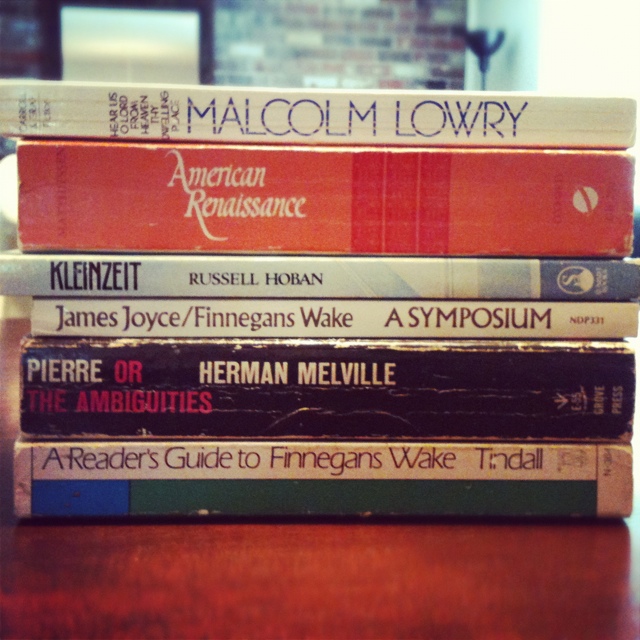
Summer wanes into fall; time to clean out the stack of books in my nightstand. Most volumes were permitted to stay, but I’m going to go ahead and find shelf space for these fellows.
The Lowry book, Hear Us O Lord from Heaven Thy Dwelling Place collects short stories and other writings. It’s a muddled, unfinished affair, and I muddled through not very much of it, leaving it unfinished.
F.O. Matthiessen’s American Renaissance: Art and Expression in the Age of Emerson and Whitman is full of insight and keen writing, but its voluminous scope and long essays kept making me wonder why I wasn’t just reading Hawthorne and Melville themselves. No knock on lit crit, but it seems wiser to spend reading time on the originals.
Speaking of Melville—I gave his incest novel Pierre another (third?) serious shot this summer, influenced by the Matthiessen, I guess. No go. Got distracted. It’s long.
I did finish Kleinzeit by Russell Hoban, a baffling schizophrenic novel that has thwarted every attempt of mine to review it. Here’s a review: it’s a strange, funny novel, a cult novel without a big enough cult.
I read several of the essays in A Symposium (ones by Beckett and William Carlos Williams), as well as the letters it includes (attacking Finnegans Wake) and Sylvia Beach’s reluctant intro. An interesting book but sometimes dry. Its inclusion, along with Tindall’s A Reader’s Guide to Finnegans Wake remind me of the brave week I spent trying to get a handle on Joyce’s language vortex. For whatever reason, I left the Wake in the stack. A dare? A dare.

Pierre is not a great novel, but it definitely a curiosity. Did you make it into the latter half of the novel, written, it has been hypothesized, as the bad reviews of Moby-Dick were rolling in? If the first half drags, and that it does, the second half devours.
LikeLike
No, Brad, I made it only about 75 pages in— maybe 3 chapters. So the second half is better?
LikeLike
Quite depends on what you like, but it is certainly & decidedly different than the first half. Everything changes once he & Isabel move to the city. Naturally, I’d say. So the hypothesis goes, Melville was so upset at the poor reception of Moby-Dick that he poured his dark invective into his new one.
LikeLike
How about some pictures of your shelves/library?
LikeLike
Hey, sure. Wow. You’re really enabling me here, Jimbo. New feature: Tuesday Bookshelf (?). Imaginary royalties headed your way.
LikeLike